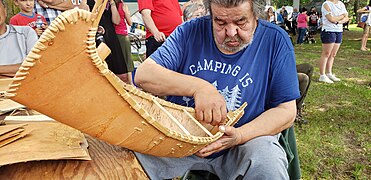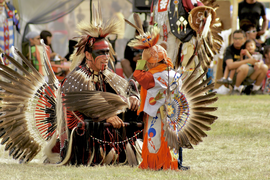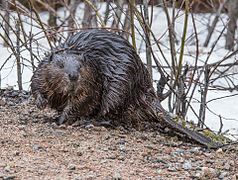|
 |
Background
Wikimedia Canada welcomes people from every background to build diverse communities. We engage in a range of activities in support of the vision of the Wikimedia movement including outreach activities, community-building events, content-creation projects, partnerships with cultural and knowledge institutions, collaborations with Indigenous communities, and training sessions. We share with the global Wikimedia movement the desire to build a sum of knowledge that is comprehensive, reliable, diverse, and of high quality. We believe this knowledge must be collected collaboratively and openly, and freely accessible by everybody. |
Priorities
|
Programs overview
|
| Program 1: Develop and diversify free knowledge about Canada and other fields of knowledge | Program 2: Increase and diversify participation in the Wikimedia movement from Canada | Program 3: Increase free knowledge about Indigenous Peoples in Canada |
 Program 1: Develop and diversify free knowledge about Canada and other fields of knowledge
Program 1: Develop and diversify free knowledge about Canada and other fields of knowledge

|

|

|

|

|

|
Goal
editThe goal of this program is to develop free knowledge about Canadian cultures, languages, history and geography as well as other fields of knowledge identified as important by the volunteer communities in Canada, such as health sciences, mainly on Wikimedia projects, and to increase the numbers and diversity of contributors from Canada. To achieve this goal, Wikimedia Canada will continue to increase, expand and strengthen its institutional partnerships with galleries, libraries, archives, museums and universities (GLAMUs) in Canada.
- Program Objectives
- Augment the quantity, improve the quality and diversify free knowledge about Canada and other identified topics, especially on Wikimedia projects
- Make existing public domain content held by Canadian institutions more freely and broadly available through the Wikimedia projects
- Increase the awareness and understanding of the Canadian public and GLAMUs about open knowledge, free licences and Wikimedia projects
Contribution workshops and campaigns
editIn order to augment free knowledge on Wikimedia projects about Canada and other identified fields of knowledge, Wikimedia Canada will continue to facilitate contribution workshops and organize national contribution campaigns.
Contribution workshops can take different formats, such as edit-a-thons. Their aim is to increase free knowledge through contribution to Wikimedia projects. They are often organized around a specific thematic. Wikimedia Canada also organizes monthly regular workshops where the public is invited to come for an initiation to contribution on Wikimedia projects.
Wikimedia Canada will continue to organize and support national contribution campaigns, including the National Contribution Month in Canada, the International Francophone Contribution Month, #1Lib1Ref, Art+Feminism, and #WPWPCA. We will also continue to organize photographic competitions, including Wiki Loves Earth and Wiki Loves Monuments.
Why are we doing this?
There are many knowledge gaps on Wikimedia projects about certain fields of knowledge of Canada, such as cultures, languages, history and geography. Through the organization of contribution workshops and editing campaigns, we will develop and improve content on Wikimedia projects about those topics. Furthermore, the volunteer contributor communities in Canada have also identified certain specific topics in which they can and are interested to contribute that are lacking quality information on Wikimedia projects, such as health sciences. Through partnerships with universities, we will encourage students and professors with relevant expertise to contribute to Wikimedia projects about those topics.
-
Training room of the Mardi c'est Wiki at the Grande Bibliothèque de Montréal
-
An Art+Feminism event in Montreal, Quebec
-
Wikidata workshop in Montreal, Quebec during the International Francophone Contribution Month
-
Wikidata presentation in Montreal, Quebec during the International Day of Open Data
-
One of the regular monthly workshops held at the Cinémathèque québécoise
-
Wikipedia workshop at the Université de Montréal during the #1Lib1Ref campaign
-
An event organized by the Café des savoirs libres in Montreal, Quebec during Fierté Montréal to improve Wikipedia articles about local LGBT personalities
-
A workshop about female scientists as part of Mardi, c'est Wiki à BAnQ and the International Francophone Contribution Month
GLAMU partnerships
editWikimedia Canada will strengthen its existing partnerships and seek to establish new ones with galleries, libraries, archives, museums and universities (GLAMUs) in Canada. Specifically, we will continue the very sucessful partnerships with Bibliothèque et Archives nationales du Québec (BAnQ), the Association francophone pour le savoir (Acfas), and the Fondation Lionel-Groulx (FLG). Furthermore, we will also build on our partnership agreement signed with Library and Archives Canada (LAC).
The impact of those partnerships have been clearly demonstrated with the activities of the past three years that resulted in an increase in quality content and in new contributors to the Wikimedia projects.
Why are we doing this?
The GLAMUs in Canada possess content and expertise that are of interest for the readers of Wikimedia projects and the public in general. Furthermore those institutions often hold content in the public domain that have great value for the Wikimedia projects, but that are not easily available online. Through education and outreach, we want to encourage those institutions to use Wikimedia projects to disseminate their knowledge and content in order to make them more broadly available to everyone.
-
Scan-a-thon during the International Archives Day at BAnQ Vieux-Montréal
-
Presentation on the Wikimedia projects during the International Archives Day at BAnQ Gatineau
-
A panel composed of representatives from Wikimedia Canada, the Acfas and the Université du Québec en Outaouais (UQO) presenting the Wikimedia projects during the Research Week at the UQO
-
A WikiPhys workshop, physics contribution workshop to Wikipedia, held at the Université de Montréal
- We will continue to support volunteers in Canada to host contribution workshops and to organize national contribution campaigns in Canada. Those have proven to be sucessful in augmenting quality content on Wikimedia projects and to attract new contributors.
What we intend to do that is new and why?
- We will put an emphasis on fields of knowledge that have been identified as important by the volunteer contributor communities in Canada. One of those are health sciences. Many professionals and unversity students across Canada have expressed an interest in contributing to Wikimedia projects about health sciences and we will support them as we believe this is a great opportunity and an important topic to be covered on Wikimedia projects.
 Program 2: Increase and diversify participation in the Wikimedia movement from Canada
Program 2: Increase and diversify participation in the Wikimedia movement from Canada
Goal
editThis programs aims at developing and diversifying the contributors communities in Canada. This includes to provide the resources to encourage their growth and support their initiatives, as well as developing their knowledge and skills to allow them to contribute more to free knowledge, especially on Wikimedia projects. Due to the large size of the Canadian territory, Wikimedia Canada aims at establishing a network of WikiClubs in different cities across the country. Those WikiClubs are local and regional hubs to deliver the programs of the chapter and conduct their own activities to further the mission of the Wikimedia movement at a local level. As such, we will continue to provide microgrants to volunteers in Canada and support local meetups of contributors. We will also support Canadian contributors to take an active role within the larger Wikimedia movement to allow them to share their knowledge with others as well as learning from the international community by participating in relevant international and regional events and bring back this knowledge to the Canadian contributors. Throughout this program, we will place a special focus on under-represented communities within the Wikimedia movement and the contributors to the Wikimedia projects, including but not limited to women, non binary people, and LGBTQ+ people.
- Program Objectives
- Empower the contributors communities in Canada with the knowledge, skills and tools required to contribute to free knowledge, especially to Wikimedia projects
- Motivate and support the volunteers in Canada to continue to contribute to free knowledge, especially to Wikimedia projects, and to organize local activities that further the mission of the Wikimedia movement
- Diversify the contributors communities in Canada to free knowledge, especially the Wikimedia projects, with a special focus on the gender gap
- Expand the activities of Wikimedia Canada across all of Canada and support the growth of existing and new WikiClubs
- Take an active role within the international Wikimedia movement to share the expertise and knowledge of volunteers from Canada as well as learning from others
WikiClubs
editIn order to expand the activities of Wikimedia Canada across all of Canada, it is necessary to develop local communities of volunteers in different cities. To do so, Wikimedia Canada will encourage the growth of existing WikiClubs and the creation of new ones. The chapter will support the volunteers in Canada and those WikiClubs with the logistical and administrative support required for them to more efficiently deliver the programs of the chapter and organize their own activities furthering the mission of the Wikimedia movement, while avoiding their exhaustion due to the burden of the workload for coordination, management, fundraising, and administration. Wikimedia Canada will also support the WikiClubs in acquiring the necessary tools for the execution of their activities.
Why are we doing this?
In previous years, the activities of Wikimedia Canada were concentrated in only a few cities in Canada. In order to increase the reach of the chapter, increase the number of contributors from Canada, and especially the diversity, it is necessary to expand the activities across all of Canada. We have found that having an active local group of volunteers is the surest way to ensure continuity in the activities in a city and to avoid the exhaustion of individuals working alone. We have also found that partnering with local institutions, such as universities, libraries and archives, is the best way to ensure the sustainability of a WikiClub.
-
Meetup of volunteers after a contribution day at Université Laval
-
Visit of Wikimedia Canada in Saguenay-Lac-Saint-Jean
Microgrants
editSince 2018, Wikimedia Canada is offering microgrants to volunteers in Canada to organize their own activities furthering the mission of the Wikimedia movement, or to organize local activities as part of a larger campaign organized by the chapter. This program ensures that funds are spent accordingly and that results are reported.
Why are we doing this?
We have found that finding funds to carry activities is often a block for many volunteers to organize activities furthering the mission of the Wikimedia movement. Through the microgrants program, Wikimedia Canada aims at facilitating their access to funds on a small scale.
- We will continue to support the growth of WikiClubs across Canada by partnering with local knowledge and cultural insitutions because it is the only way to organize activities across all of Canada, which is necessary to increase the number of contributors and especially the diversity of contributors. We will also continue to offer microgrants to volunteers in Canada because we have found that for the small investment we get great results and that it is often the small support needed for the volunteers to maintain their motivation to organize activities.

























